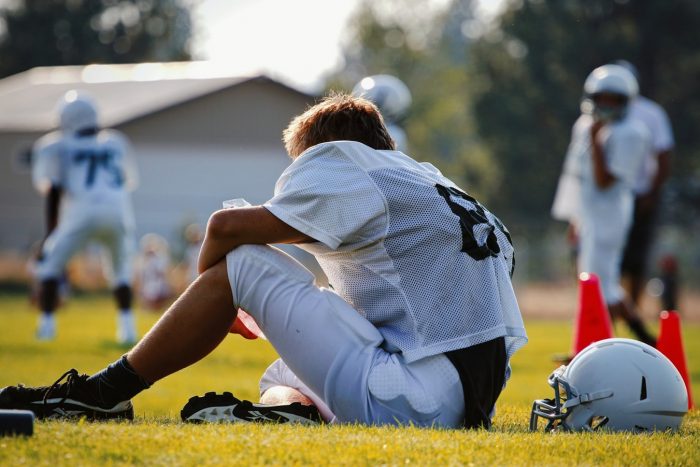15 Things Athletes Should Know


My late father-in-law enjoyed college football, but he never let the outcome dictate his mood.
In fact, he often joked, “Don’t let your happiness depend on 18-year-old boys.”
That is easier said than done, right? Especially here in the South, where football is like a religion, victories and defeats can dictate moods for weeks or months on end.
Why the obsession? Why is football a billion-dollar industry? I find it interesting (and kind of crazy) that Americans will pack stadiums and pour money into a sport that revolves around one ball. Many people care more passionately about who dominates that one ball than they do eternal matters.
Yet God’s genius is that He can use anything – even one ball – to speak to us. He meets us where we are and often tells epic stories in stadiums and arenas. Through both lows and mountaintop moments, we can experience Him, learning lessons about life and character that can only be taught through exhilarating, high-stakes events.
Following are 15 things that I believe athletes should know. Whether you’re a college co-ed or Little Leaguer, male or female, the same principles apply.
1. Humility matters. Athletes often develop egos due to praise or obsessive worship, but remember: You’re only one bad break away from being out of the game forever. Talent is fragile, and every day you have it is a gift. You could wake up tomorrow without your gift, so enjoy it, use it, but always stay grateful for the grace behind every blessing.
2. Your inner light matters. Christine Caine said, “If the light that is on you is brighter than the light that is in you, the light that is on you will destroy you.” Pride comes before the fall, and history is filled with superstars who fell from grace because of arrogance and misguided ambition.
Only with Christ’s light inside us are any of us capable of fighting the human tendency to let praise or success inflate our egos.
3. Emotions are good followers and terrible leaders. Playing sports can trigger tricky emotions (anger, disappointment, sadness, jealousy) that have to be processed yet kept in check. Tangled emotions make it hard to think clearly or act reasonably and can lead to impulsive behavior. The short-term relief isn’t worth the long-term consequences. In addition, gloating and bragging can be just as harmful to relationships and reputations as the negative emotions commonly seen.
4. Even the greats have off-days. Even superstars get mental blocks. Today may not be your day or your season, and that’s okay. It doesn’t make you weak; it makes you human.
God’s power is made perfect through weakness, and your lowest moments are your best opportunities to grow in faith and learn to depend on Him.
5. Defeat lets you push the reset button. In sports and life, you learn more from your losses than your wins. Better competitors help you see how you can improve. They raise the bar and motivate new growth and higher thinking. If you always win, contentment can set in. You’ll feel tremendous pressure to perform and stay on top.
But as the underdog, you can prepare and experiment without the pressure of expectations or spotlights. You can let people underestimate you – and then prove them wrong.
6. Who you listen to can make or break you. It’s worth playing a sport just to train under exceptional leaders. Strong coaches, leaders and mentors are worth their weight in gold, and if you’re coachable – letting them shape you, stretch you, and cultivate a champion’s heart – you’ll be better prepared for life.
Critics and twitter trolls, on the other hand, will only discourage you with their negative energy.
Guard your heart and your mind, and remember the biggest threat is the critic in your head. Believe in yourself even when no one else does.
7. Your uniform isn’t your identity. Playing a sport doesn’t define you. Hanging up a uniform once the season ends doesn’t change who you are. Your identity in Christ and your status as a child of God are set in stone. Even as circumstances change, even as you leave the sport you once loved, you can count on this rock.
8. You are a role model. What people witness in you they assume must also be true about your school, your friends, your organization, and your family. Represent them well.
9. Sometimes your best won’t be good enough. Give your best anyway. Getting your heart ripped out of your chest hurts. Falling short despite a 150% effort makes it really tempting to quit.
But giving your best, every time, builds character and grit. It gives you the peace of having no regrets because you couldn’t have done more. It prepares you for the future and better things to come.
10. The point of having talent isn’t to show off, but to point people to God. Whatever stage, notoriety, microphone, or platform you have, use it for good. Show class and be a light as God visibly works through you to reveal invisible truths.
11. You can quickly become yesterday’s news. Fans are fickle and will re-channel their attention to the Next New Thing. If your self-worth is based on human approval, if you have nothing real and lasting to cling to, changes in public opinion and fan loyalties will crush you. Appreciate fan support, but play for your audience of One.
12. Any records you set will eventually be broken. Celebrate your achievements, but don’t let them go to your head. James Dobson has a sermon about visiting his old high school and finding his tennis trophies in the trash to make room for new ones in the trophy case. He realized then how human accomplishments never stand the test of time, and rather than put emphasis on those, we should work to grow God’s kingdom.
13. People relate to your struggles more than your successes. Talent may win games, but character wins hearts. How you handle adversity, how you prepare for opportunities even while you ride the bench, and how you dig deep to face obstacles inspires the people around you. It helps them be brave, too, and makes you a hero for who you are and who you are becoming.
14. How you treat your teammates is a big test of character. It’s natural to compare yourself to peers and feel either inferior or superior, but good teammates get over this. Nobody takes all the credit or all the blame because they realize how multiple players lay the groundwork so one person can finish the job. When a teammate is down, encourage them. When they’re on fire, cheer for them. After all, there are already people watching who hope they will fail. Don’t be one of them.
15. Sports are temporary, but God is forever. Your greatest legacy isn’t the name you build for yourself, but the name you magnify as your faith is put into action.
In the end, we’re all on the same team. We may compete for the one ball, but we’re united under one God. That trumps everything.
And no matter what the final score is, the real victory happens in the hearts of players, coaches, and fans. Sports can break hearts and heal hearts, reveal character and character flaws, and tell emotionally riveting stories that shape and inform the public conscience.
Friday night and Saturday afternoon may bring an adrenaline rush as we cheer for our favorite teams, but Sunday brings peace. One is temporary and one is eternal, and keeping in mind the difference can make the weekend more enjoyable and keep our hearts and priorities in the right place.
******************************************************************************************************************************
 Thanks for reading this message today. If you enjoyed it, please share it on social media.
Thanks for reading this message today. If you enjoyed it, please share it on social media.
My new book Love Her Well: 10 Ways to Find Joy and Connection with Your Teenage Daughter is now available, and it’s getting a fantastic response. You can find it everywhere books are sold, including Amazon and Audible. What a privilege it’s been to narrate my first book for moms!
My two books for teen girls, 10 Ultimate Truths Girls Should Know and Liked, have been used widely across the U.S. for group studies. For more posts, subscribe to this blog or join me on Facebook, Instagram and the Girl Mom podcast.
Posted by Kari on October 15, 2019








Always enjoy reading your thoughts. Hope your family. Is doing well.
Thank you, Julia, hope you are doing well too!